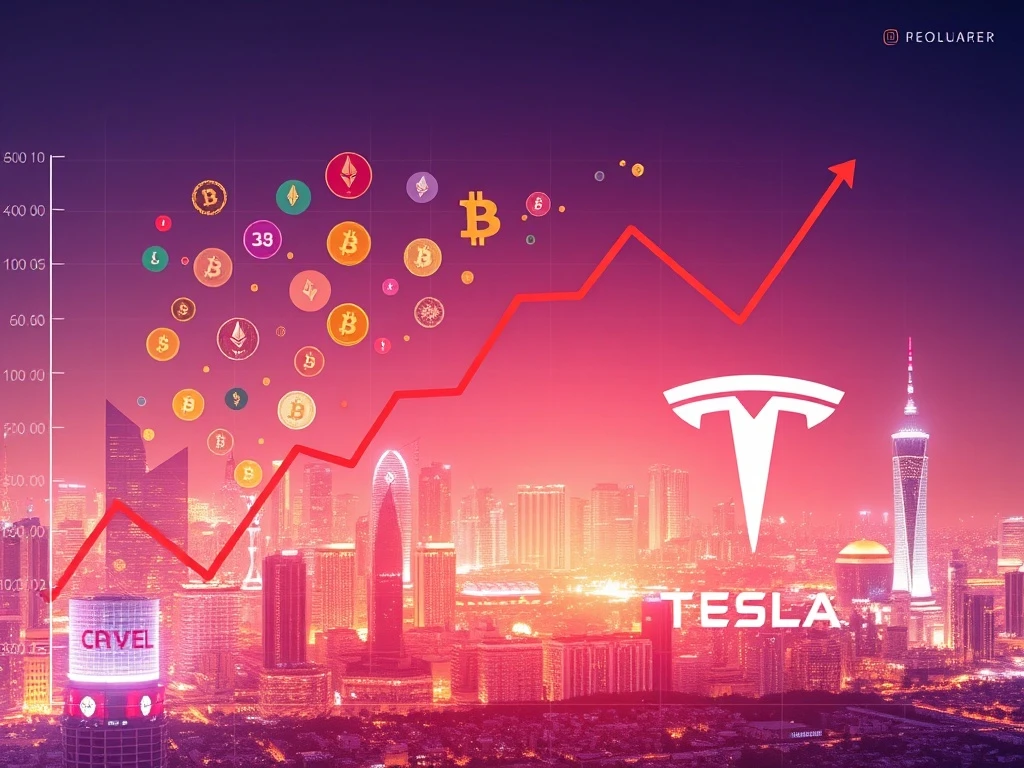South Korea Crypto Investment Unleashes Massive $12B Shift, Jolting Global Markets

A dramatic financial shift is unfolding in South Korea, catching the attention of investors worldwide. Korean retail investors, once steadfast supporters of Tesla, have initiated a significant **Tesla stock outflow**, withdrawing an astounding $657 million from the electric vehicle giant in August 2025 alone. Simultaneously, a colossal $12 billion has poured into US-listed cryptocurrency firms, signaling a profound reorientation of capital. This pivotal move by **Korean investors Tesla** holdings highlights a growing confidence in the digital economy and promises to reshape **global crypto markets**.
Korean Investors Exit Tesla: A Staggering Outflow
For years, Korean retail investors were instrumental in driving Tesla’s global stock market surges. However, August 2025 marked a turning point. Investors pulled a substantial $657 million from Tesla stock. This represented the largest monthly outflow in over two years, indicating a significant shift in sentiment. The withdrawal extended beyond direct stock investments. Leveraged products tied to Tesla, such as the 2x leveraged exchange-traded fund (ETF), TSLL, experienced outflows of $554 million during the same period. This was the largest since early 2024.
This sell-off reflects a notable decline in enthusiasm among retail investors who previously boosted Tesla’s gains. It points to more than just financial figures. The move signifies a shift in investor confidence and diminishing trust in the electric vehicle (EV) company’s future. It also indicates a growing interest in alternative opportunities, specifically US-listed cryptocurrency firms. This shift is striking, even though Korean investors still hold around $21.9 billion in Tesla shares, which remains their largest foreign equity holding. While this does not erase their long-term commitment, it certainly highlights growing uncertainty about Tesla’s future direction.
Why Loyalty Faded: Tesla’s Challenges Drive Tesla Stock Outflow
After years of loyalty, **Korean investors Tesla** pullout stems from several concerns about the company’s trajectory. These factors have collectively eroded investor confidence:
Missed Promises: Tesla frequently failed to deliver on bold deadlines. For example, Elon Musk promised 1 million robotaxis by 2020 and widespread Full Self-Driving (FSD) capability. Years later, this technology remains in beta. Similarly, the long-delayed Cybertruck only began deliveries in late 2023, years behind schedule. The next-generation Roadster, initially set for 2020, may now launch in 2025.
Political Fallout: Musk’s frequent interventions in US politics and social life cast a shadow on his credibility. His public disagreements with figures like President Donald Trump and polarizing comments on social issues have further eroded his reputation in some circles. His brief entry into government and swift, unceremonious departure also contributed to this.
Declining Sales: In Q2 2025, Tesla’s global deliveries plunged by 13%-13.5% year-over-year, reaching approximately 384,122 units compared to 443,956 in Q2 2024. European sales in July 2025 dropped 40% year-over-year, with only 8,800 cars delivered. The company’s year-to-date sales dove 34%, and its market share in EVs decreased from 11% to 5%.
Rising Competition: Chinese automakers like BYD, Nio, and XPeng, alongside European giants such as Volkswagen, now offer cheaper, feature-rich EVs. The arrival of these alternatives significantly impacted Tesla’s dominance. For instance, BYD tripled its July sales in China to around 13,500 units, surpassing Tesla’s 8,800 units. XPeng delivered 37,709 units in August 2025, a 168.7% year-on-year increase. Nio also achieved record deliveries, with 31,305 vehicles, up 55.2% YoY. BYD emerged as the leader, selling 373,626 EVs in August and over 1.1 million EVs in Q2 alone, nearly three times Tesla’s Q2 deliveries.
Unpredictable Leadership: Musk’s abrupt shifts, including buying Twitter (now X), prioritizing AI projects over EVs, and sudden management shakeups, created significant uncertainty around Tesla’s core focus and future direction.
The Unstoppable Rise of South Korea Crypto Investment
South Korean retail investors, known for their informed decisions in global stocks, are now pivoting towards cryptocurrency-related assets. This shift became undeniable by September 2025, marking a new direction for Korean investment abroad. By mid-2025, South Korean investors had already poured over $12 billion into US-listed cryptocurrency companies. The sheer scale and speed of this investment wave demonstrate how Korean traders, often called “fearless retail,” are embracing cryptocurrency. They see it as both a growth opportunity and a hedge against declining confidence in traditional stocks like Tesla.
August 2025 particularly highlighted the intensity of this shift. Investors allocated $426 million to Bitmine Immersion Technologies, a company closely linked to Ethereum’s growth. Circle, the issuer of USDC, received $226 million, while Coinbase, the largest cryptocurrency exchange in the US, attracted $183 million in Korean investments. Even high-risk products saw strong demand; a 2x leveraged Ether ETF drew $282 million in the same month. This reflects retail investors’ enthusiasm for amplified exposure to the sector.
The surge of **South Korea crypto investment** into cryptocurrency stocks is likely more than just speculative activity. It appears to represent a fundamental change in investor preferences. This shift could influence how Asian capital flows into **global crypto markets** and how cryptocurrency gains adoption as a mainstream asset class.
Driving Forces Behind Digital Assets Adoption in Korea
South Korea’s pivot from traditional stocks to cryptocurrency-related assets results from a powerful combination of social, regulatory, and economic factors. Together, these elements explain why the country has become one of the world’s most active retail markets for **digital assets adoption**.
Demographics and Adoption: The popularity of cryptocurrency in South Korea is deeply rooted in its population. Approximately 20% of South Koreans now own digital assets, with this figure climbing to 25%-27% among those aged 20-50. This demographic group typically possesses the most financial resources and a greater willingness to take risks. This generation grew up with the rapid adoption of digital technologies, from mobile payments to online trading platforms. They also have a cultural inclination toward speculative investments. This blend of technological familiarity and risk tolerance makes cryptocurrency naturally align with their financial habits.
Regulatory Support: Regulation, once an obstacle for crypto growth, has now become a driving force. South Korea’s approach to regulating cryptocurrency is evolving to be more supportive. This is demonstrated by the implementation of the Virtual Asset User Protection Act (VAUPA) in 2024, designed to safeguard investors and deter unfair trading practices. Furthermore, ongoing plans for the Digital Asset Basic Act (DABA) aim to establish a comprehensive regulatory framework for all virtual assets. This clear regulatory pathway fosters greater trust and encourages further **digital assets adoption**.
Economic Conditions: South Korea’s economic environment has become increasingly conducive to cryptocurrency adoption. Consistently low interest rates and limited investment opportunities within the country encourage investors to explore higher-yield options, such as digital assets. Moreover, slowing growth in traditional industries, like automotive and manufacturing, drives investors to pursue alternative sources of returns. A declining won, combined with significant capital flows into dollar-backed stablecoins, has also encouraged investment in crypto assets.
Reshaping Global Crypto Markets: South Korea’s Influence
South Korea, with an estimated GDP of around $1.87 trillion in 2024, has emerged as a significant force in **global crypto markets**. South Korean investors, renowned for bold, high-volume trading, have shifted billions from traditional stocks like Tesla into cryptocurrency-related stocks and ETFs. This substantial influx of capital has boosted liquidity for US-based exchanges, mining companies, and tokenized financial products. This boost, in turn, improves the global visibility and credibility of digital assets.
South Korean investors have also shown a preference for leveraged investments, such as 2x Ether (ETH) ETFs. This increases short-term market volatility and affects price movements worldwide. Furthermore, South Korea’s shift is likely to shape institutional and retail investment approaches across the globe. Fund managers may customize products to meet this rising Korean demand. Consequently, South Korean retail traders are exporting their speculative energy, creating both opportunities and potential instability in the wider market. Their commitment to cryptocurrencies is reshaping global capital flows and investor behavior. Even regulators worldwide observe Seoul’s policies as potential models for their own frameworks.
The dramatic re-allocation of capital from Tesla to crypto by South Korean investors represents more than just a financial transaction. It signifies a paradigm shift in investor confidence and a clear endorsement of the digital economy’s future. As **South Korea crypto investment** continues to grow, its ripple effects will undoubtedly be felt across **global crypto markets**, driving innovation and shaping the future of finance.









